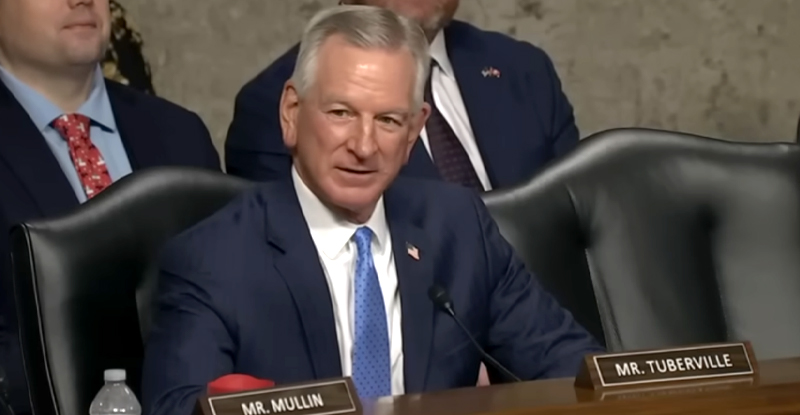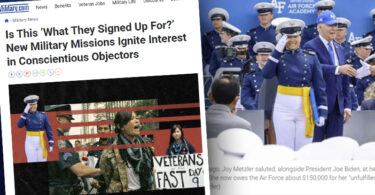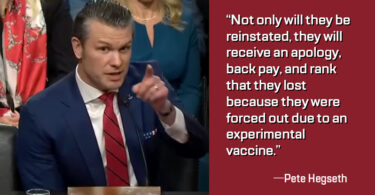Senator Tommy Tuberville discusses the woke problem in the military service academies with Pete Hegseth during Hegseth’s confirmation hearings. This excerpt from the Senator is telling:
I had a young man that forever wanted to go to West Point. I got him a nomination. I got him accepted and he turned it down. He said, ‘Coach, I’m not getting involved with that mess.’ How are we gonna overcome this?”
Also this:
I met with a couple of Navy Seals, not too long ago. They just got back from crawling around in the mud and the muck overseas, unknown places, couldn’t tell you where they’ve been, carrying a weapon, obviously protecting us and our allies. In the first week they’re back, what did they do? They had to go through a week of DEI training. Both are now out of the military. They gave it up. It was embarrassing to them—what they had to do.
Tuberville Questions Hegseth, Encourages Him to Represent War Fighters, Not Warmongers as Secretary of Defense (Sen. Tuberville)
U.S. Senator Tuberville (R-AL) questioned President Trump’s nominee for Secretary of Defense, Pete Hegseth, at his confirmation hearing before the Senate Armed Services Committee (SASC).
During the discussion, Sen. Tuberville asked Mr. Hegseth about his plan to improve military recruitment numbers, which have been in steep decline the last four years.
Sen. Tuberville and Mr. Hegseth also discussed plans to get the Pentagon refocused on winning wars, not on pushing a woke agenda.
Read Sen. Tuberville’s remarks below or on YouTube or Rumble.
TUBERVILLE: “Thank you, Mr. Chairman, and thanks for your hard work and your Committee’s hard work. Mr. Chairman, this is going well.
I’d like to submit this letter, ‘Topic Conduct at Vets for Freedom for Hegseth.’ I’d like to submit that for the record, please.”
WICKER: “Without objection.”
TUBERVILLE: “General Hegseth, I mean, Mr. Hegseth.
Thanks for being here today—and with your family. I know this is tough. That’s what it’s all about, though. You’re a tough guy. [I’ve] been here for a while [and I’ve] never seen this many people here for support of a nominee. That’s impressive. I met with a lot of them yesterday, and they are very passionate. So, thank you for [being] willing to take this on, and congratulations on your nomination.
I’m worried about recruiting. I mean, we can look at everything out there and talk about all these things, these narratives.
But at the end of the day, I came from a team sport where the people, the players actually win the games. And that’s what’s gonna happen here. You’re not gonna win the game. Now, you’re gonna set the precedent. You’re gonna get the blame or the credit. But there’s gonna people that’s gonna be under you that’s gonna set the precedent for the future of our country.
Now, the war games that we play on our computers with our adversaries right now, for us, it [doesn’t] look good because our military — we’re in trouble. Our whole country is in trouble. Thank God President Trump got elected November 5th. We couldn’t [have] kept [going] down this same path. We could not—that could not happen.
[…] [I] met with a couple of Navy Seals, not too long ago. They just got back from crawling around in the mud and the muck overseas, unknown places, couldn’t tell you where they’ve been, carrying a weapon, obviously protecting us and our allies.In the first week they’re back, what did they do? They had to go through a week of DEI training.
Both are now out of the military. They gave it up. It was embarrassing to them—what they had to do.
We’ve lost all sight of what we’re doing in our military. Lost all sight. It starts with leadership, and it starts with recruiting.
Why would a young man — used to [be] when I was growing up — if you couldn’t afford to go to college, you had the opportunity to go to the military where you could learn a trade. You could learn. You could make a living for your family and eventually, possibly get an education. That was a good alternative.
We’ve forgotten that. We’ve forgotten it. We can’t give up on our young people. Young people are our number one commodity in this country. And they’re the ones that’s gonna live and die for the freedom of this country in the future.
So again, thanks you for taking this on.
Recruiting—our service academies are meant to serve as our primary commissioning source of officers. It now appears that they are a breeding ground for leftist activists and champions of DEI and Critical [Race] Theory. Not all, but some and some is way too much.
How are we gonna eliminate this, Mr. Hegseth? How are we gonna get this back on track to where we grow our leaders?
I had a young man that forever wanted to go to West Point. I got him a nomination. I got him accepted and he turned it down. He said, ‘Coach, I’m not getting involved with that mess.’ How are we gonna overcome this?”
HEGSETH: “Senator, thank you for the question. And I think it comes down to leadership. Clear leadership from President Trump, through me, should I be nominated.
And that’s what soldiers Sailors, Airmen, Marines, and Guardians see. It’s clear leadership. It says, this is what we believe, this is the mission we’re gonna give you, here’s the equipment we’re gonna give you, and here’s how we’re gonna support you.
Because the military at a lot of levels, Senator, has been for generations a family business. You know, my grandfather served, my father served, I served, my daughter served. That chain has started to break.
With generations of people my age and older talking to their kids and grandkids, wondering, pondering do I want them to serve? Will my country use them responsibly?
When that kind of doubt is cast, you get serious recruiting problems like we do right now. You get questions about whether I want my son or daughter to follow my path in West Point, which I’ve heard multiple times. Would I want my [child going to school there]?
And so, you have to rip, root and branch, the politics and divisive policies out of these institutions. And then focus them on creating and preparing actual future military leadership.
West Point traditionally is focused on engineering. And rightfully so because in our fighting forces across all surfaces we need the best and brightest minds in engineering, in addition to military studies, that’s what I did at ROTC at Princeton, military science.
That and we need more uniformed members going back into West Point, the Air Force Academy, the Naval Academy, as a tour to teach with their wisdom of what they’ve learned in uniform.
Instead of just more civilian professors that came from the same left wing woke universities that they left and then try to push that into service academies. When that changes, Senator, I truly believe under Donald Trump, we will have a recruiting renaissance.
That sends signals to the world—to our enemies and our allies alike, that America’s back. And thankfully, then we have the men and women of our country willing to wanna serve.”
TUBERVILLE: “Thank you. And it’s about attitude too. And I love your attitude. You’ve gotta be motivated. You’ve gotta understand that people […] will [work] with you. They will understand and learn under their leaders.
Why would you fight for a country that you don’t love? That’s what I keep hearing from a lot of our college kids that they’re getting from these woke universities that they go to […].
That is one of the excuses I get from our kids. We’ve got to break that.
Another one, according to the Pentagon between 2001-2024, the number of civilian employees in the Office of the Secretary of Defense has nearly doubled from 1,500 to 3,000.
Civilians on Joint Chiefs has increased from 191 to almost 1,000.
Our military in strength goes down, our staff numbers are exploding. What are you gonna do about that?”
HEGSETH: “Senator, we’re gonna address that. We won World War II with seven four-star generals. Today, we have 44 four-star generals. There’s an inverse relationship between the size of staffs and victory on the battlefield. We don’t need more bureaucracy at the top.
We need more warfighters and power at the bottom.
So, it’s gonna be my job working with those that we hire and those inside the administration to identify those places where fat can be cut so it can go toward lethality.”
TUBERVILLE: “Thank you.”








Leave a Comment